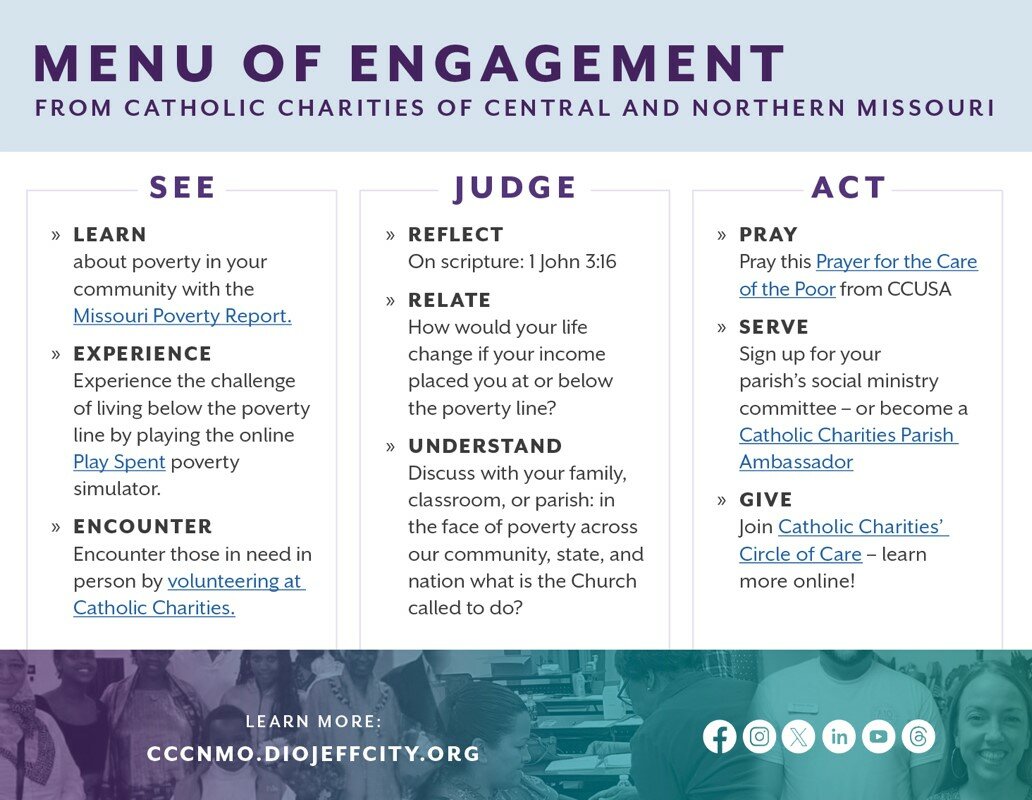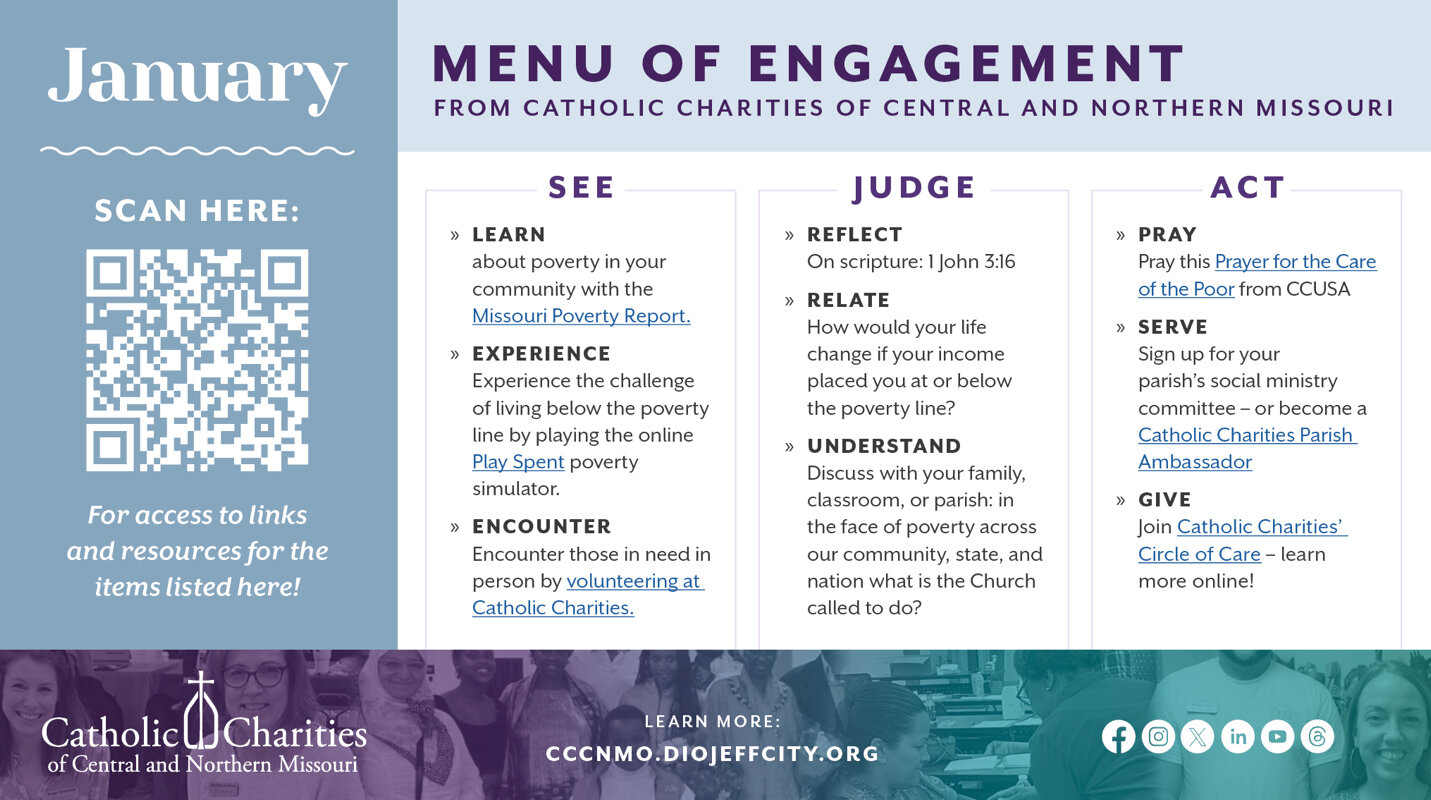Seeking to understand poverty
Encounter at Catholic Charities

Have you ever stopped to think, I mean really think, evaluate, even visualize, what the reality of poverty looks like in your local community?
What image comes to your mind?
Is it a person experiencing homelessness holding a sign at the intersection on your way to work?
Is it your co-worker, friend or family member waiting in line at the Catholic Charities Food Pantry for some grocery support this week?
The edges of need are so pervasive and sometimes blurry — you may not even know that your neighbor is seeking utility assistance just to keep the lights on in their home, or that a family member of your own is taking on credit card debt just to try and make ends meet.
In today’s Encounter reflection, we’re just scratching the surface of the uncomfortable truth of poverty.
While I have always considered myself an understanding person, thought I knew what poverty looked like and sought ways to empathize and help others who were experiencing hardships, my eyes were never fully opened until my work at Catholic Charities.
For a good portion of my life, I generally felt that a person was completely in control of, and even responsible entirely for, their own financial situations.
It’s taken some introspection for me to examine that understanding.
While I still believe that it can be true to an extent, it simply does not take into consideration the complex levels and situational experiences of poverty in our communities.
Having been blessed in my own lived experiences with good physical and mental health, and financial stability, it’s an interesting lens to gaze through as I encounter so many seeking help from Catholic Charities, who don’t even have a place to sleep at night.
Through my work as a HUD-Certified Housing Counselor at Catholic Charities — one of three HUD housing agencies for our entire service area — my understanding of poverty has evolved.
In my work, I experience many calls a day from people just like you and I, but who now have nowhere to call home, often due to not being able to afford their rent or mortgage anymore.
Many or most of these people have found themselves without the safety nets of family or friends to help them get back on their feet and into a new home.
They must now look for a shelter to stay at, most of which operate at capacity and around this time of year are completely full.
Then they may turn to staying in their car; one caller once asked if we could help purchase a tent for them to sleep in.
Going from the place you call home to leaving most of your possessions behind and living in your car or moving forward with no shelter at all in a matter of days — that is a lived reality for some across mid-Missouri.
Sometimes triggered by health issues, flooding or other weather events, the loss of a job, or even a family member — many people living in our communities and neighborhoods are one disaster away from poverty.
Some folks in this situation are working for low-pay jobs and the income simply cannot meet the expenses regardless of how much budgeting they do.
Finding a higher paying job can be nearly impossible if they are undereducated or lacking skills.
Picking up a second job with small children as a single mom and finding affordable childcare are non-starters — not to mention the difficulty of applying for work without a mailing address and showing up after sleeping in your car.
Some clients are unable to work and often have the additional burden of significant health struggles.
Some of these clients do have income and healthcare from the government, and some do not.
These clients are struggling in the most difficult ways in life.
They are without a place to call home, they are physically unwell, and they don’t know what comes next.
Can you imagine the stress and the effect of this stress on your already failing physical health?
Your mental health?
There is no denying that the need to care for these people is critical.
While eliminating all poverty is a mountain we will never climb, Catholic Charities’ impact and the impact of other organizations can help alleviate this burden in our local communities.
While I do often feel overwhelmed with the need, I am also overwhelmed with the resources and the kindness and generosity of my colleagues, our volunteers, and our community partners who have the same goals in alleviating poverty and the suffering of those in financial hardship.
In my work, I assist many with finding a safe, clean, affordable place to call home as well as working with them on finances and credit and budgeting.
However, equally impactful to me is the ability to simply see and hear these people in need, and to honor their stories — stories that deserve to be heard.
It is really an encounter for me to lend a client the dignity of a helping hand and a listening ear.
Many of these clients have few to no family relationships or friendships.
They take on navigating this impossible burden alone until they do find the help that they need.
With me, they express gratitude, and find peace in having someone to accompany them, checking in when nobody else is.
While the financial need to support our agencies and the poor directly will always be there, I also know not everyone will be able to give financially.
Gifts of your treasure to support our work are wonderful, but equally important is a call that we can each answer: to not discount the poor.
To not assume you know each of their stories.
To let go of the assumptions and biases about how they found themselves in this place to begin with.
To take a pause and recognize that you may not know what they have been through and cannot imagine how difficult it is to be them.
This is the first step in honoring the Dignity of Human Life, and each of us can afford others the dignity they deserve as inherently worthy of what the Creator has made them for.
I encourage you to learn, grow, and keep an open mind — finding ways to pray for others and work to alleviate poverty where you can — whether by providing care materially or creating hope for those you see.
Paige Orscheln is the HUD-Certified Housing Counselor at Catholic Charities of Central and Northern Missouri. As one of two HUD-Certified Housing Agencies for our 38-county diocese, her assistance in renter and homebuyer education, credit and budgeting counseling, and securing affordable housing are an integral part of our Community Services Program.
January is Poverty Awareness Month — a time where, in our abundance, we can seek to understand those who have little or nothing. Catholic Charities USA’s mission is to reduce poverty in America, and at Catholic Charities of Central and Northern Missouri we also seek to alleviate the suffering of those experiencing poverty — lack of food, housing, security, healthcare, education, and more. You can join in our work by downloading this month’s Menu of Engagement, and finding ways to See, Judge, and Act in response to poverty in our communities. Learn more at cccnmo.diojeffcity.org/menus-of-engagement.
Comments
Other items that may interest you
Services
The Catholic
Missourian
2207 W. Main St.
Jefferson City MO 65109-0914
(573) 635-9127
editor@diojeffcity.org







